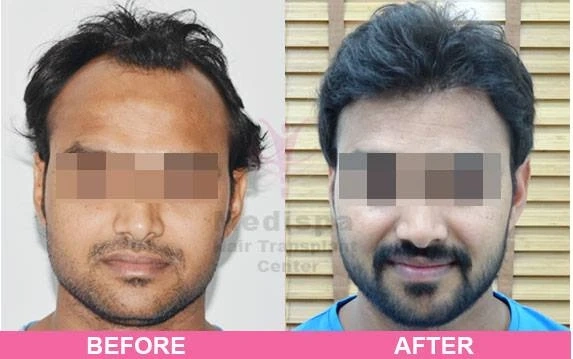Hair transplant procedure is a safe surgical procedure with negligible significant risks or complications associated. As every surgical procedure there are minor temporary side effects or complications associated which are easily bearable and manageable with minimal care and instructions.
Hair transplant is a minimally invasive surgical procedure which when performed by a super specialized, experienced and expert surgeon is free of significant risks and offers best results. The procedure of hair transplant involves extracting or harvesting of hair follicles from high density donor area to the bald recipient area. The basic steps of hair transplant surgery includes:
Administration of local anaesthesia in donor as well as recipient area.Grafts harvesting from the donor area by FUT, FUE or combination technique of FUT+FUE.Preparation of implantation site by slitting procedure.Implantation of follicular grafts in the bald recipient area.PRP therapy (optional)Post operative instructions and follow upProfessional hairs wash after 24 hours.Post procedure of hair transplant there are few after care considerations to minimize the temporary side effects associated with the procedure. For achieving best results it is mandatory to strictly follow the instructions as per the surgeon prescription. These short complications usually subsides within few days probably a week after the hair transplant surgery and do not cause morbidity to patients in the first few days.
Medispa hair transplant clinic, just like its name believes in offering you a relaxing experience of hair transplant surgery. We take care of our patients at every step since the day of primary consultation to the after care of the procedure for fruitful results and patient’s satisfaction. Dr Suneet Soni has performed more than 5000 patients of hair transplant surgery of patients from all over the world. He is celebrated as one of the most renowned and pre-eminent surgeon for hair transplant in Jaipur. He suggests that post transplant care is equally credited for the success of results and negligence on that part could lead to failed results and regret. Hence, Medispa clinic constantly follow up their patients for benefitting them with the best possible results.
The various short term complications considered after hair transplant surgery includes:
Itching: Itching is common followed by hair transplant procedure during the healing phase which often subsides within 10 days after the procedure. It can be easily managed by regular shampooing and application of lotion as prescribed by the surgeon. The reason for itching is the formation of flakes or scabs surrounded by the planted follicles. Severe itching is a very rare occurrence which when occur should be consulted by the surgeon. It is mandatory to avoid touching the recipient area in any case for at least 7 days after the hair transplant procedure. In cases of severe itching anti allergic medications are prescribed.Pain: Mild and temporary pain could be a possible complication after the hair transplant procedure which often subsides within 3-5 days after the procedure. Usually the pain is often bearable and does not require any medication. In case of unbearable pain which is one of the rarest incidents after hair transplant, surgeon should be consulted immediately. Pain killers should not be taken on your own as aspirin is a pain killer and blood thinner which is avoided during and after the hair transplant surgery. Always consult the respective surgeon in case of severe or unbearable pain.Swelling: Temporary swelling is also a common finding after hair transplant surgery which subsides within a week after the procedure. It could reside in the forehead or sometimes extends till the eyebrows. There are multiple instructions given by the surgeon post procedure to reduce its occurrence and faster recovery. Patient is advised to sleep by placing the head at 45° for at least 3-5 days. Including, a head band is provided to the patient for wearing to avoid swelling which is often prescribed to wear for 4 hours a day for 2 days. Aspirin, alcohol and smoking is strictly prohibited for 7-10 days after the procedure.Numbness or paresthesia: Mild and short term numbness could be a possible complication following the hair transplant procedures residing for weeks. Proper follow up is necessary to look regarding numbness and if not resolved should be consulted by the surgeon on an urgent basis.Bleeding: It is a rare complication of hair transplant surgery but can be easily resolved by applying static pressure for some time. It is always better to take professional help and consult your surgeon in his case.Infection: Usually infection is not a complication of hair transplant surgery if performed in proper aseptic operatory. It is a consequence usually if you opt for a clinic with lack of maintenance of hygiene standards or negligence on your part during after hair transplant care. The choice of clinic should be made judiciously to avoid this complication as could be severe sometimes which could be life threatening also. In addition, post transplant care should be followed strictly and avoid exposure of dirt by wearing loose cap following the procedure for first few days as prescribed by the surgeon.Temporary thinning: Sometimes after the hair transplant procedures there are chances of temporary thinning of hair shafts of the existing hairs which is often termed as “shock loss”. This is purely temporary and normal hairs will revert back in couple of months.Scalp pimple: They usually are possible side effects of hair transplant procedure also called folliculitis. Despite being a complication it is rather a good sign which depicts the growth of hair follicles underneath the scalp skin. These scalp pimples bursts and followed by it, the hair shaft might shed which is normal. The temporary hair shaft loss is followed by growth and visible hair growth after 3-4 months. Hence, usually it disappears on its own but should not be taken lightly and consulted immediately after noticing.Hiccups: It is also a common finding after hair transplant but the reason is not identified yet. It can last for several days to weeks but disappears on its own.

